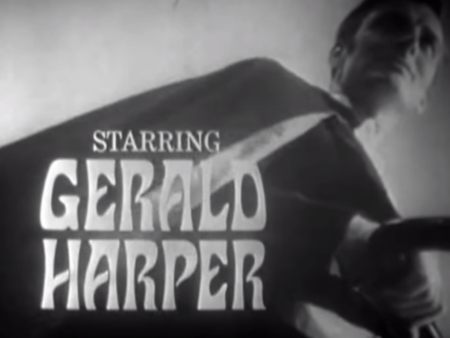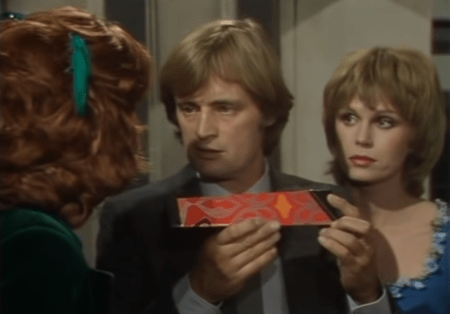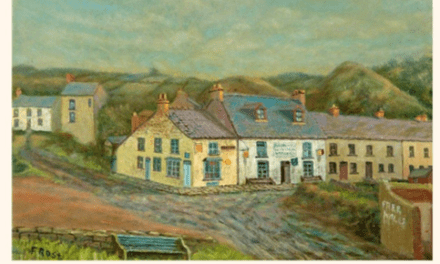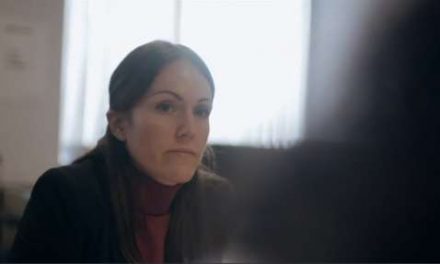When I first started contributing to CSTonline last autumn, the thrust of the piece was all about effective communication of ideas and concepts – the inspiration being the superb Saturday that my wife and I had spent in attendance at Dr Nicolas Pillai’s ‘Jazz on the Telly’ conference at Birmingham City University.
The whole issue of tailoring communication for a specific audience was something that had been looming largely in my fifty-something-or-other old mind for a couple of years, and an issue where I had suddenly become very aware that I’d become very stagnant. At times, living here, in the Future, is a struggle and leaves one feeling a little like Adam Adamant [i]… but it’s a struggle that’s made all the easier when one gets to work with people who are not as chronologically gifted (i.e. old) as one’s self. Or, to put plainly, people who are about three decades younger. Most of whom seem to own mobile phones.
A shining example of a person with an abundance of youthful energy is Emily Cook. She’s an assistant producer and journalist with BBC Radio Kent and also an editorial assistant on Doctor Who Magazine. We’ve been working together now since 2015 and she’s an extremely smart lady who learns very quickly, has an acute grasp of the past and the present, and can quickly see the core of an issue or the thread of popular culture narrative.
Anyway… the first time that my wife and I met Emily was at an archive television event in 2017. Lovely day out. And at one point we were having a coffee with Emily and her colleague Peter – an old friend of ours – when some nice people came over to them and asked if they could get some photographs with them in their capacity as bona fide Doctor Who Magazine staff. Being similarly nice people, Emily and Peter complied with delight. Being rather less-nice people with an irrational fear of cameras, my wife and I declined – hopefully politely.
Emily was a bit bemused at our desire to avoid the lens. So I explained.
“Sorry Emily. But I remember what Steel told me. ‘Find every photograph of you that there is. Burn them. Never have another taken.’.”
Peter fell about. He’d possibly been watching ITV at around 8.25pm on Thursday 5 February 1981. Or at least across the years forked out for a VHS tape or new-fangled DVD disc of the ATV series Sapphire & Steel (1979-1982), specifically Adventure Four – a very tense and un-nerving narrative about a faceless figure which lives inside photographs and can do very nasty things to people trapped inside them. And he knew this line and context off by heart.
Emily sat there being – well – rather cruelly locked out of the gag.
Now, as I said, Emily’s a smart lady. She has two incredibly good degrees in linguistics, knows that I’m imminently going to use a hyphen un-necessarily, embodies the self-starting motivation to try to educate the street children of Kolkata.
But Emily hadn’t been watching ITV at around 8.25pm on Thursday 5 February 1981 – for the very reasonable excuse that she simply hadn’t been born, and the perfectly acceptable excuse that there is finite time to consume historical television and that she was really focused on Doctor Who (1963-HeatDeathOfTheUniverse) rather than fascinating items starring that bloke from The Man from UNCLE (1964-1968) and that woman from The New Avengers (1976-1977)… two other shows she’d probably never seen either.
Up until this point, I’d really prided myself on piling on the cultural references – right back to a massively archaic “Mind my bike!” if the mood took me – in the belief that they enriched my currency as a popular culture commentator. And back in the 1990s when we all only owned about the same 100 VHS tapes, that was probably a smart thing. Unfortunately, it wasn’t the 1990s any more – and for an increasingly global audience of different ages and experiences, these throwaway cultural touchstones were as likely to be a barrier as they were to being a facilitator. Was there any point to employing potent period phrases when they were increasingly to be met with the bewildered response: “What’chu talkin’ ‘bout, Willis?”
You see how easy it is.
So, it was a major turning point for me as a writer in learning to ensure that what I was writing was going to be accessible for the audience. I can’t assume that a readership knows instinctively that Tony Hancock was a comedy actor or that Channel 4 started regular broadcasts on 2 November 1982 or that what comes after the title sequence of Department S (1969-1970) generally doesn’t seem to be quite as good as what comes before it. I’d been doing it for so long I’d got lazy and had forgotten about the prime objective of my communication.
And thanks to Emily, and various subsequent discussions with her, it’s a technique that I always employ now when I’m writing. I’m even employing it now. It may not seem that I’m doing that, but that’s because CSTonline is – despite my contributions – meant to be a focus for academic work in the field of television. And I expect that if an academic encounter something that they don’t understand or are not familiar with, then they’ll go and look it up [ii]. It’s what I do when other postings here present me with new ideas and concepts. It’s a different platform for writing.
And what cheered me even more at the weekend was seeing this interview with Emily. She’s doing all the things that I really like to see in an interview – keeping the subject matter front and centre, shifting the focus onto the skills and talents of others, demonstrating Olympian reserves of get-up-and-go, can-do attitude, etc, etc. – but also yet again showing how understanding means of communication and applying it to the given situation means that a massively beneficial project has ensued at this time of global concern and crisis.
Emily took her own fears regarding the pandemic and turned them into a practical solution – a potent distraction to raise spirits by organising a watch-along of a show which has made millions of people happy across the years with its depictions of a problem-solving hero: Doctor Who. Using technology such as Twitter, she connects not only with other fans who share her passion for these adventures in space and time, but also with those creative talents who made them in the first place. As such, people in isolation can briefly escape their worries with a fantastic voyage evoking happy memories – and now in the company of legendary names offering insight and bonus content.
Talk about communicating effectively and engaging with an audience! Using television to help people? I think the Doctor would be proud…
While, by comparison, all I seem to be doing are these facile [iii] blogs about nothing in particular.
Well – maybe this one, thanks to Emily, has a bit more value than usual.
Andrew Pixley is a retired data developer. For the last 30 years he’s written about almost anything to do with television if people will pay him – and occasionally when they won’t. He was going to write something about episode titles this week because it was going to be easy and lazy and he thought he’d got a couple of smart alek gags up his sleeve – but then he read this interview with his friend and wanted other people to understand how utterly brilliant she was. And he hopes that now they do.
Footnotes
[i] You can google that one too.
[ii] And if you needed to and haven’t, then it was what Gary Coleman as Arnold Jackson used to say in the sitcom Diff’rent Strokes (1978-1986). Shame on you… As for “Mind my bike”, well, I’ll leave that for you to sort…
[iii] Yes – my wife and I are happy to be totally facile. To prove how facile we are, we have an amazing friend called Liz who keeps telling us about all the amazing French films that she enjoys and admires such as Intouchables (2011). Sadly, in response all we can offer her in return on the subject is The Return of the Pink Panther (1975) and – at a push – Pollux et le Chat Bleu (1970).









Lovely post, Andrew – and thanks for the compliments about the interview with Emily – it was a delightful conversation (and that’s probably only about half of what we discussed).
My pleasure Paul – it was a smashing read and I wanted to encourage others to experience its sheer smashingness.
Hope all is well with you and yours and that you’re safe and well. 🙂
All the best
Andrew
Hi Andrew. Interesting article and the meaning of cultural references is something we all need to think about when speaking with others who don’t share our frame of reference.
As an aside, I’d be interested in chatting to you for the podcast I run, Something Who. I’ve spoken with a few people to discuss their involvement in fandom, and those episodes have been among our our most popular. I’m sure our listeners, who almost certainly share your cultural frame of reference, would be interested to hear from you.
If you want to hear what we’ve done before committing yourself, we’re at cstonline.net//cstonline.net//somethingwho.podbean.com/
Let me know if that appeals. No image necessary!
Hello Richard 🙂
Thank you for your kind comments – this moment, and certainly a lot of my subsequent discussions with Emily – really brought a lot of this home to me, and made me realise that time had moved on and I needed to alter some of my approaches.
And thank you very much for your deeply kind invitation to do something for the podcast. I’ve heard a few of them and they’re rather lovely aren’t they? In particular, the one with Jeremy Bentham – who is still one my heroes and somebody whose standards I was inspired by – was absolutely lovely and came around the same time that I was writing my piece in tribute to him for CSTonline.
However… I’m afraid that I don’t really like to do sound or vision interviews. I did one for university radio in 1983 to see if I liked it … and I didn’t … and I have a horrible feeling I ended up being quite rude about the university, which I shouldn’t have been. A lovely fella called Jeff who did a brilliant podcast about “The Goodies” with his wife Jane offered me a chance to see if I felt the same way some 27 years later when I felt that I *should* be promoting my book on “The Goodies” which was only fair after all the time and effort a lot of other people had put into it on my behalf. This time, I hopefully didn’t end up being rude about people… and while Jeff was terrific and did a lovely job on the edit, I still felt a tad uneasy because I can’t *think* quickly enough for interviews. As such, I’m not due to give it another go until around 2037…
I do hope you understand… and your offer is really a very kind and thoughtful one because, as you say, no image would be necessary.
Anyway, it sounds like you’re having a lot of fun with people who are far, far more “Doctor Who”-centric than myself, and whom I’m sure will continue to offer some quality chat to you and all your listeners for some time to come! The fun certainly comes across in the editions that I’ve heard.
Hope all is well with you and yours during this terrible time. Take care.
Andrew
Hello Andrew, lovely post and hope you are keeping well!
Hello Andrew! Yes! You star! Leading a boring life means that adjustments for us have been minimal and therefore we’re coping a lot better than many people. Very much hope that all is good with you and yours and that you’re getting by okay. Thank you for taking the time and trouble to post your comment – much appreciated.
Stay safe and well.
Andrew